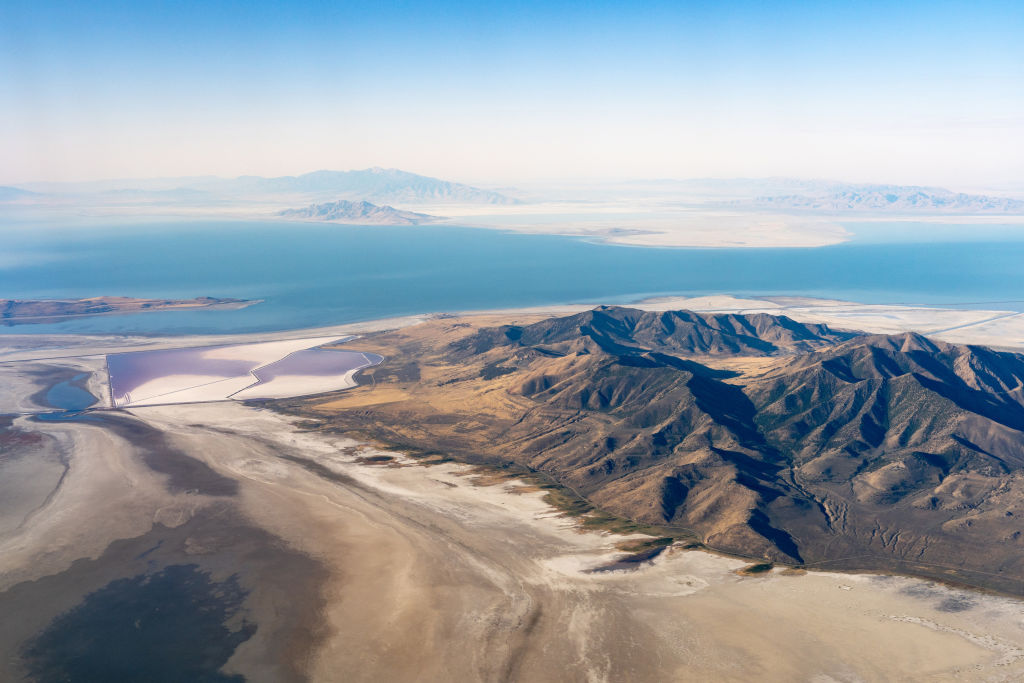Great Salt Lake could become hotbed of toxic air pollution


A free daily email with the biggest news stories of the day – and the best features from TheWeek.com
You are now subscribed
Your newsletter sign-up was successful
The Great Salt Lake, located in Utah, is at risk of drying up as it hits its second year in a row with historically low water levels. The lowering levels have also exposed 800 square miles of the lakebed containing soils contaminated with toxic compounds and heavy metals. The soil will turn into dried dust if the lake water evaporates, a potential phenomenon that CNN has named the "Great Toxic Dustbowl."
"This is an ecological disaster that will become a human health disaster," director of the Great Salt Lake Institute at Westminster College Bonnie Baxter told CNN. "We know about dust storms, we know about particulate pollution, we know about heavy metals and how they're bad for humans."
The lake is solely filled by rain, snow, and runoff and does not have any connection to the ocean. Because the water does not flow elsewhere, salt and sediment build over time with nowhere else to go, giving the lake its saltiness. As a result, President Biden signed a bill designating $25 million to research salt lakes and "assess, monitor, and benefit the hydrology of saline lakes in the Great Basin," per Axios.
The Week
Escape your echo chamber. Get the facts behind the news, plus analysis from multiple perspectives.

Sign up for The Week's Free Newsletters
From our morning news briefing to a weekly Good News Newsletter, get the best of The Week delivered directly to your inbox.
From our morning news briefing to a weekly Good News Newsletter, get the best of The Week delivered directly to your inbox.
Scientists say that the lake can be saved, but it will require extensive effort. "Science provides crucial perspective, understanding, and scenarios for policymakers to chart a path forward," says a report by a team of researchers called the Great Salt Lake Strike Team. "Many policy levers can help return the lake to healthy levels."
"We have to get more water to the lake," said Brian Steed, co-chair of the strike team and executive director of the Janet Quinney Lawson Institute for Land, Water, and Air. "For a long time, I don't think that people were sufficiently talking for the lake."
A free daily email with the biggest news stories of the day – and the best features from TheWeek.com
Devika Rao has worked as a staff writer at The Week since 2022, covering science, the environment, climate and business. She previously worked as a policy associate for a nonprofit organization advocating for environmental action from a business perspective.
-
 The Week Unwrapped: Do the Freemasons have too much sway in the police force?
The Week Unwrapped: Do the Freemasons have too much sway in the police force?Podcast Plus, what does the growing popularity of prediction markets mean for the future? And why are UK film and TV workers struggling?
-
 Properties of the week: pretty thatched cottages
Properties of the week: pretty thatched cottagesThe Week Recommends Featuring homes in West Sussex, Dorset and Suffolk
-
 The week’s best photos
The week’s best photosIn Pictures An explosive meal, a carnival of joy, and more
-
 How climate change is affecting Christmas
How climate change is affecting ChristmasThe Explainer There may be a slim chance of future white Christmases
-
 Blue Origin launches Mars probes in NASA debut
Blue Origin launches Mars probes in NASA debutSpeed Read The New Glenn rocket is carrying small twin spacecraft toward Mars as part of NASA’s Escapade mission
-
 Why scientists are attempting nuclear fusion
Why scientists are attempting nuclear fusionThe Explainer Harnessing the reaction that powers the stars could offer a potentially unlimited source of carbon-free energy, and the race is hotting up
-
 Dinosaurs were thriving before asteroid, study finds
Dinosaurs were thriving before asteroid, study findsSpeed Read The dinosaurs would not have gone extinct if not for the asteroid
-
 Canyons under the Antarctic have deep impacts
Canyons under the Antarctic have deep impactsUnder the radar Submarine canyons could be affecting the climate more than previously thought
-
 SpaceX breaks Starship losing streak in 10th test
SpaceX breaks Starship losing streak in 10th testspeed read The Starship rocket's test flight was largely successful, deploying eight dummy satellites during its hour in space
-
 NASA is moving away from tracking climate change
NASA is moving away from tracking climate changeThe Explainer Climate missions could be going dark
-
 Rabbits with 'horns' sighted across Colorado
Rabbits with 'horns' sighted across Coloradospeed read These creatures are infected with the 'mostly harmless' Shope papilloma virus
